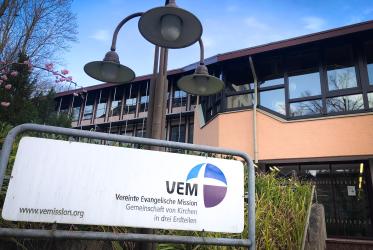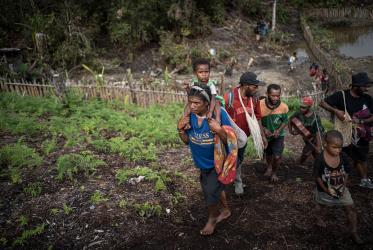Justice and peace have been high on the agenda of the churches for a very long time. In their pursuit of peace, churches are inspired by Jesus Christ, the prince of peace who promised to give peace to all his followers.
“Peace I leave with you; my peace I give to you; not as the world gives do I give to you. Do not let your heart be troubled, nor let it be fearful.” (John 14:27).
In the Old Testament, Yahweh, the God of justice, spoke through God’s prophets and always stood by the suffering and oppressed and delivered justice to those who were deprived. Therefore, justice and peace are inherent to and basic tenets of Christian faith.
However, the churches tend to focus more on “peace” than on “justice”. This is primarily due to the traditional understanding of peace as mere absence of violence. The biblical teaching of “turning the other cheek” seems to be opposed to a confrontational pursuit of justice.
Therefore, it is important to challenge the notion of peace without justice. The Bible has ample examples of God rejecting this “passive” peace devoid of justice.
“They dress the wound of my people as though it were not serious. ‘Peace, peace,’ they say, when there is no peace.” – (Jeremiah 6:14)
God made it clear to the Israelites what is important to God.
“I hate, I reject your festivals, nor do I delight in your solemn assemblies. (… ) But let justice roll down like waters, and righteousness like an ever-flowing stream.” (Amos 5:21-24).
Therefore, it is important that we as church must not segregate peace and justice, as they are inseparable and incomplete without each other. The 10th Assembly of the World Council of Churches in Busan, South Korea, called the churches to embark on a “Pilgrimage of Justice and Peace”. This has given us an opportunity to explore peace with justice to deeper levels and review our work with a just-peace perspective.
From the very beginning, the work of Ecumenical Water Network (EWN) of the WCC had a justice perspective. We are in the process of developing a theological framework on water justice. The WCC Assembly’s call for a Pilgrimage of Justice and Peace was indeed a shot in the arm for the EWN’s work on “water justice”.
The EWN believes that water, the source of life, is a gift of God and is a basic human right for all. Therefore, we demand that no one should be denied of this basic right of theirs.
Yet we know that more than 748 million people, as per United Nations statistics, are deprived of “improved access” to water.
“Improved access” does not necessarily mean access to “safe” drinking water. Indeed, close to 2 billion people are estimated to drink water that is faecally contaminated.
While there is plenty of water available to fill swimming pools, water golf courses, and supply luxury hotel industries, not to mention zillions of water bottles for sale in every nook and corner of the world, how can so many people be allowed to go without safe water to drink?
This blatant injustice is why the EWN affirms that the global water crisis is not due to physical scarcity of water. Rather, governments lack political will to provide this life giving resources to those who are deprived, when they can sell water to corporates and earn billions of dollars.
It is also interesting to note that the people of economically poorer countries tend to pay more for access to water than those of the richer countries. For example, some Palestinian communities in Gaza and the West Bank spend up to two thirds of their income on water, whereas most Swiss, who earn high wages even compared to other developed countries, pay hardly any water charges (and as they are included in the house rent, they do not directly relate to actual usage either).
While the poor in many parts of the Global South have to walk miles even for muddy water, in most of Europe, including my current home town of Geneva, clean, cool drinking water is used to flush the toilets. I once asked an employee of Geneva’s water utility why high quality drinking water is flushed down our toilets. He told me it would be much more expensive to layout another set of pipelines to provide “less safe” water for sanitation purposes. “We have plenty of water in Geneva. So don’t worry.”
Access to water has to be addressed with equity, dignity and justice.
The 15 years’ timeframe of the Millennium Development Goals (MDGs) of the United Nations will end by mid-September 2015. Goal #7 (c) was to reduce the number of people without improved access to water and sanitation by half. While the progress on sanitation still lags behind as over 2.5 billion people remain without adequate sanitation facilities, technically the target related to water was achieved in 2010.
But, again, “improved access” does not necessarily mean safe access.
At the UN General Assembly in New York in September this year, the MDGs will be replaced by “Sustainable Development Goals”. One of the 17 goals in the draft is to “Ensure availability and sustainable management of water and sanitation for all” by 2030 (goal #6). The lack of human rights language in the formulation raises doubts on how this goal can be achieved, though.
The civil society must continue to put pressure on governments to stick to their commitments.
This week, the International Reference Group of the EWN will meet in Geneva to strategize how the churches can be advocates for water justice.
Keep visiting our website and social media pages and help us with your ideas, prayers and financial support to carry forward our vision to ensure “universal access to water and sanitation” at least by 2030.






